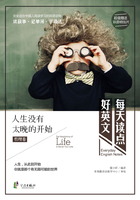
第12章 首先做一个堂堂正正的人
First, Be a Man
奥里森·马登/Orison Marden
卢梭说:“按照自然的法则,每个人都是平等的,很好地表现人性是人类共同的责任。任何一个受过良好教育的人都会很好地完成一切与他相关的工作。不论我的学生将来会成为军人、牧师,还是律师,对我来说都相差无几。我所要教给他们的是要堂堂正正地活着。当一个人完成教育生涯,他不会是一位军人,不会是一名律师,也不会成为一名神职人员,但他首先会是一个堂堂正正的人。不论命运为他作了怎样的安排,他都很乐观,并会很快地找到自己的位置。”
美国第二十任总统詹姆斯·加菲尔德在孩提时期被问及长大后的愿望,当时他这样回答:“首先,我要让自己成为一个堂堂正正的人,假如我做不到这一点,那么任何事情都不会成功。”
现今世界迫切地需要优秀的人才。未来的人们应具有超强的能力,以承受来自文明高度集中的社会所带来的紧张生活和压力。他们必须精力充沛,身体健康,而仅没有疾病不能说是真正的健康。只有拥有足够的力量源泉,而不是一杯半盏,才能让未来的生活和前途不滑入低谷。一个人只有身体健康,才会因自身的存在而欢欣雀跃;他的生命才会五彩斑斓;他才会感受到跳动的脉搏穿梭全身;才会从各个方面来感受生命的喜悦,像狗在原野上撒欢,或者孩子们在冰原上滑行一样。
作为医生,对待病人应该温和体贴;作为律师,应该身无债务;作为政治家,应该坦诚地进行选举;作为穷人,应该勤勉努力。
只有当一个人能够满足自己,不需要借助拐杖或引导者也能往前走的时候,他才会觉得很快乐。
“运动员的身体以及圣人的灵魂,”伏尔泰写信给爱尔维修时说,“是我们开心快乐的必要保证。”
在各类工作中,我们的确拥有了更好的技术和忠诚,可是它们往往是以精神和道德的损害为代价而发展的。
一个纯粹的技术人员,他的思想是狭隘的。更糟糕的是,从一定程度来讲,他只是一个机器人,一种技术与专长结合在一起的生物,他已经远离了人性中最主要的情感交流。在社会生活中,那些仅仅在专业技能上有非凡成就的人,往往是不具备生活能力的人;他的灵巧已把他的个性埋没其中。
人类的天性是尝试着各种方法,来引导我们遵从她的规则。她以健康、快乐和幸福作为对人类遵从其规则的回报,以痛苦和疾病来作为对人类不遵从其规则的惩罚。因此,她凭借引导我们的每一种方法,来延伸、发展其所灌输给我们的遵守规律的最大可能性。她激励我们去奋斗。她将所有美好的祝福蕴含在其中作为奖励,将祝福高高地悬挂在我们前方,引导着我们努力前进。而这些极具诱惑力的奖励,或许是我们都能触摸到的,也可能是永远也不能拥有的。人类的天性以各种考验作为她训练的结尾,以光明的未来抚慰饱经磨难的性格,以此来避免艰难、枯燥的现实使我们失去勇气,而导致她的伟大目标失败。就像一位母亲教她的孩子学走路一样,她会在远处拿着一个玩偶,目的不是为了让孩子得到玩偶,而是为了锻炼孩子的肌肉和力量,至于是什么样的玩偶则无关紧要。所以,天性在我们生命过程的前方,举着越来越好的玩偶来诱导我们,而最后的目标始终清晰可见,那就是——我们所得到的成就。
Rousseau says:"According to the order of nature, men being equal, their common vocation is the profession of humanity; and whoever is well educated to discharge the duty of a man cannot be badly prepared to fill any of those offices that have a relation to him. It matters little to me whether my pupil be designed for the army, the pulpit, or the bar. To live is the profession I would teach him. When I have done with him, it is true he will be neither a soldier, a lawyer, nor a divine. Let him first be a man. Fortune may remove him from one rank to another, as he pleases, he will be always found in his place."
"First of all." replied the boy James A. Garfield, when asked what he meant to be, "I must make myself a man; if I do not succeed in that, I can succeed in nothing."
One great need of the world today is for men and women who are good animals. To endure the strain of our concentrated civilization, the coming man and woman must have an excess of animal spirits. They must have a robustness of health. Mere absence of disease is not health. It is the overflowing fountain, not the one half full, that gives life and beauty to the valley below. Only he is healthy who exults in mere animal existence; whose very life is a luxury; who feels a bounding pulse throughout his body; who feels life in every limb, as dogs do when scouring over the field, or as boys do when gliding over fields of ice.
Dispense with the doctor by being temperate; the lawyer by keeping out of debt; the demagogue, by voting for honest men; and poverty, by being industrious.
A man is never so happy as when he suffices to himself, and can walk without crutches or a guide.
"The body of an athlete and the soul of a sage," wrote Voltaire to Helvetius, "these are what we require to be happy."
In the professions, it is true, we find greater skill and faithfulness, but usually they have been developed at the expense of mental and moral breadth.
The merely professional man is narrow; worse than that, he is in a sense an artificial man, a creature of technicalities and specialties, removed alike from the broad truth of nature and from the healthy influence of human converse. In society, the most accomplished man of mere professional skill is often a nullity; he has sunk his personality in his dexterity.
As Nature tries every way to induce us to obey her laws by rewarding their observance with health, pleasure and happiness, and punishes their violation by pain and disease, so she resorts to every means to induce us to expand and develop the great possibilities she has implanted within us. She nerves us to the struggle, beneath which all great blessings are buried, and beguiles the tedious marches by holding up before us glittering prizes, which we may almost touch, but never quite possess. She covers up her ends of discipline by trial, of character building through suffering by throwing a splendor and glamour over the future; lest the hard, dry facts of the present dishearten us, and she fails in her great purpose. As a mother teaches her baby to walk, by holding up a toy at a distance, not that the child may reach the toy, but that it may develop its muscles and strength, compared with which the toys are mere baubles. So Nature goes before us through life, tempting us with higher and higher toys, but ever with one object in view—the development of the man.